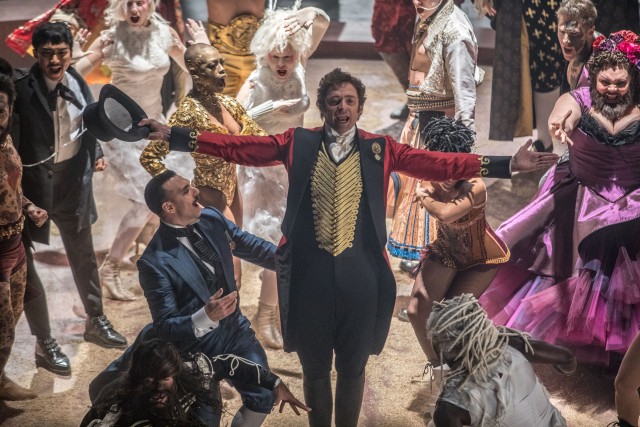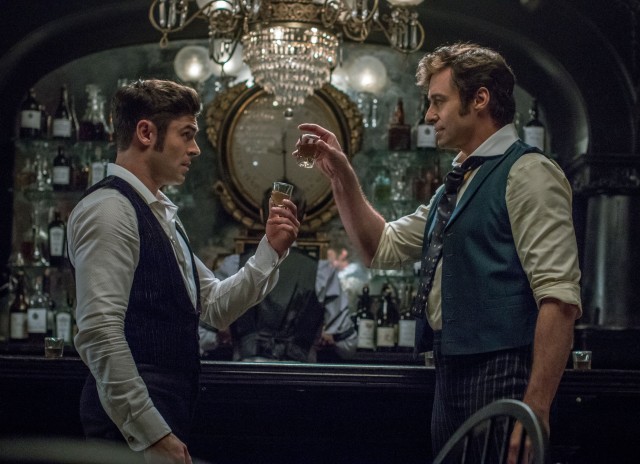The Greatest Showman Movie Review
 |
The Greatest Showman
Theatrical Release: December 20, 2017 / Running Time: 105 Minutes / Rating: PG Director: Michael Gracey / Writers: Jenny Bicks (story & screenplay); Bill Condon (screenplay) Cast: Hugh Jackman (P.T. Barnum), Michelle Williams (Charity Barnum), Zac Efron (Phillip Carlyle), Zendaya (Anne Wheeler), Rebecca Ferguson (Jenny Lind), Austyn Johnson (Caroline Barnum), Cameron Seely (Helen Barnum), Keala Settle (Lettie Lutz), Sam Humphrey (Tom Thumb), Yahya Abdul-Mateen II (W.D. Wheeler), Eric Anderson (Mr. O'Malley), Ellis Rubin (Young P.T. Barnum), Skylar Dunn (Young Charity O'Malley) Songs: "The Greatest Show", "A Million Dreams", "A Million Dreams (Reprise)", "Come Alive", "The Other Side", "Never Enough", "This Is Me", "Rewrite the Stars", "Tightrope", "Never Enough (Reprise)", "From Now On" |
The musical biopic The Greatest Showman casts Hugh Jackman as P.T. Barnum, the man who popularized the circus. At the film's opening, P.T. (Ellis Rubin) is just a poor boy from a poor family in New York. But P.T. grows up quickly (Jackman laughably seems to inherit the role in his teens), successfully woos Charity (now Michelle Williams) and tries to make a name for himself by opening a museum of curiosities. To drum up business, he decides to put live human oddities on display. These include a bearded woman (Keala Settle), a very small man (Sam Humphrey), a very tall man, a very fat man, and a brother-sister team of trapeze artists.
It isn't until Barnum meets successful theatrical producer Phillip Carlyle (Zac Efron) that his circus, a word he takes from a cultural critic's disapproving review, takes off, even as some folks resent having "freaks" present in their neighborhood and paraded for a price.
Much like how zoos provoke a mix of reactions from animal lovers, the circus raises concerns for those who have compassion for their fellow human beings. The Greatest Showman is well aware of that and tackles the issue head on, making Barnum not just a smooth-talking profiteer but a champion for those who are different. The movie celebrates society's outcasts again and again, even after Barnum changes his game plan to pin the enterprise's financial hopes on Jenny Lind (Rebecca Ferguson), a Swedish opera singer who dazzles even the most cynical of Barnum's detractors.
The film toys with a love triangle as Lind develops feelings for Barnum that are unrequited. There is also a romance which blooms between the well-off Carlyle and one of the performers (Zendaya), of which, needless to say, his snooty parents do not approve.
Featuring all-original songs by the duo that wrote the lyrics to last year's triumphant crowdpleaser La La Land (but probably more directly evoking their work on NBC's "Smash"), The Greatest Showman has its heart in the right place and themes you can't resist getting on board with. But the results are uneven and often underwhelming. The screenplay by Bill Condon (writer of Chicago, director of Beauty and the Beast, and writer-director of Dreamgirls) and Jenny Bicks ("Sex and the City", "The Big C", Rio 2) is far from graceful and the ample charisma of actors like Jackman and Williams can only take you so far.
Making an inexplicable directing debut on a project of some weight, Australian former visual effects lackey Michael Gracey hides his inexperience and seems at ease with big show-stopping numbers, expansive camera work, and ambitious staging. On a technical level, the film delivers and though I probably wouldn't notice or complain otherwise, the singing and dancing seems more than adequate. On ambitious, substantially-budgeted musicals like this, the result is typically either clear success or clear failure both critically and commercially. But The Greatest Showman feels like a pretty middle of the road effort, one that will draw some critical disdain but not a Nine level of resentment. I suspect it won't be the big box office hit that well-received musicals adapted from the stage (Les Mis, Mamma Mia!) have been, but presumably it fares better than flops like Jersey Boys and Rock of Ages.
|
Related Reviews:
DVDizzy.com | DVD and Blu-ray Reviews | New and Upcoming DVD & Blu-ray Schedule | Upcoming Cover Art | Search This Site
DVDizzy.com Top Stories:
Now in Theaters: Jumanji: Welcome to the Jungle • Star Wars: The Last Jedi • Ferdinand • Lady Bird • The Disaster Artist • Coco
Hugh Jackman: Logan • Prisoners • Australia | Michelle Williams: Wonderstruck • Manchester by the Sea • Oz the Great and Powerful
Zac Efron: High School Musical • 17 Again | Rebecca Ferguson: Florence Foster Jenkins • The Girl on the Train | Zendaya: Spider-Man: Homecoming
Written by Bill Condon: Dreamgirls • Chicago
Musicals: La La Land • Beauty and the Beast (2017) • Nine • Annie (1982) • Annie (2014) • Rock of Ages • Jersey Boys • Grease Live!
Toby Tyler, or Ten Weeks with a Circus • Dumbo
Text copyright 2017 DVDizzy.com. Images copyright 2017 20th Century Fox and Chernin Entertainment. Unauthorized reproduction prohibited.

